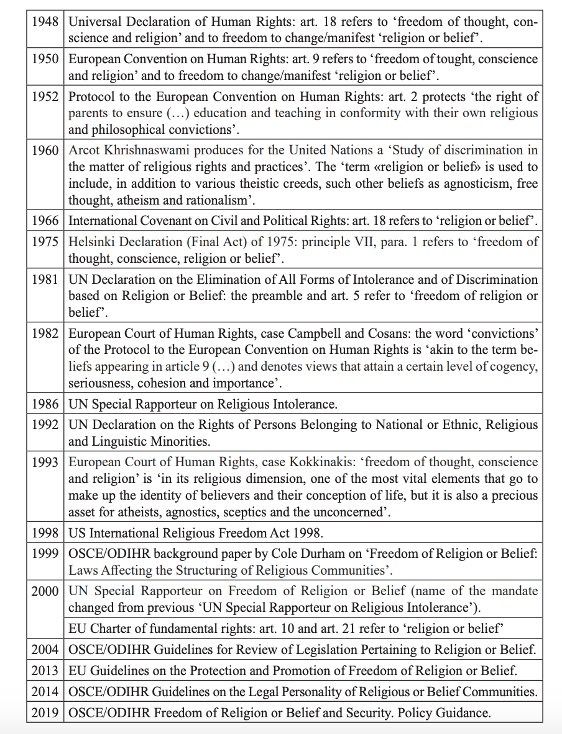
Pasquale Annicchino is a senior assistant professor of law at the University of Foggia (Italy). He is a member of the OSCE/ODIHR Panel of Experts on Freedom of Religion or Belief.
How many times have we used the phrase “freedom of religion or belief”? Could it be that we have been mistaken in employing that phrase all along? The rapid pace of technological change might necessitate a reevaluation, bringing us back to the original phrasing in Article 18 of the Universal Declaration of Human Rights: “freedom of thought, conscience and religion.”
In Freedom of Religion or Belief: An International Law Commentary (2016), authors Heiner Bielefeldt, Nazila Ghanea, and Michael Wiener acknowledge in the book’s first footnote that they use “freedom of religion or belief” as shorthand. Bielefeldt and Wiener rightly point out in a later publication that the “full title of the human right under discussion is ‘freedom of thought, conscience, religion or belief’.” They note that, in international and UN discourse, however, “freedom of religion or belief” has become standard shorthand for this longer title. In fact, the term has become mainstream and institutionalized; for example, it is used in the title of the United Nations Special Rapporteur on freedom of religion or belief and the OSCE Panel of Experts on Freedom of Religion or Belief.
While discussions of phrasing may appear to be a mere rhetorical exercise, Professor Marco Ventura has recently emphasized the significant practical implications that the emergence of the phrase “freedom of religion or belief” has brought to the legal debate, especially through experimentation in the “European Union laboratory.” Ventura’s work, specifically Table 1 (see below), traces the evolution of this phrase (or in his terminology this “formula”) from a European perspective, illustrating and criticizing its establishment as the dominant terminology.

As I have discussed elsewhere, this adoption of “freedom of religion or belief” as standard terminology was not straightforward and was influenced by political and ideological forces. In English, terms like “religious freedom,” “freedom of religion or belief,” and “religious liberty” are often used interchangeably, though they may not convey the same rights content.
In light of emerging technologies, such as neurotechnology, which Professor Nita Farahany has shown to pose serious threats to our fundamental rights, including the right to freedom of thought, conscience, and religion, it is imperative to reconsider our terminology. Recently the Australian Human Rights Commission in the report Protecting Cognition: Human Rights and Neurotechnology has argued that
[w]ith an increasing understanding of the brain, it is possible that neurotechnologies in coordination with other technology (geotracking, data gathering etc [sic]) may be capable of not only coercing or manipulating a person’s decisions but also discerning their internal thoughts or beliefs. It is concerning that, despite the protection in Article 18, this could lead to persecution based on a person’s belief.
Because new technologies can interfere with personal thoughts, conscience, religion, or belief, returning to the original language of international documents is important to ensure that the protection and promotion of “freedom of religion or belief” is adapted to new technological challenges. In the digital era, the right to freedom of thought, conscience, and religion is more relevant than ever. While “freedom of religion or belief” has served us well, it is time to embrace the more encompassing and original phrase: “freedom of thought, conscience and religion.” Freedom of religion or belief is dead. Long life to freedom of thought, conscience, and religion or belief.
